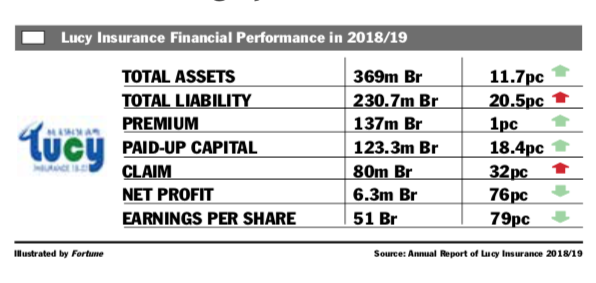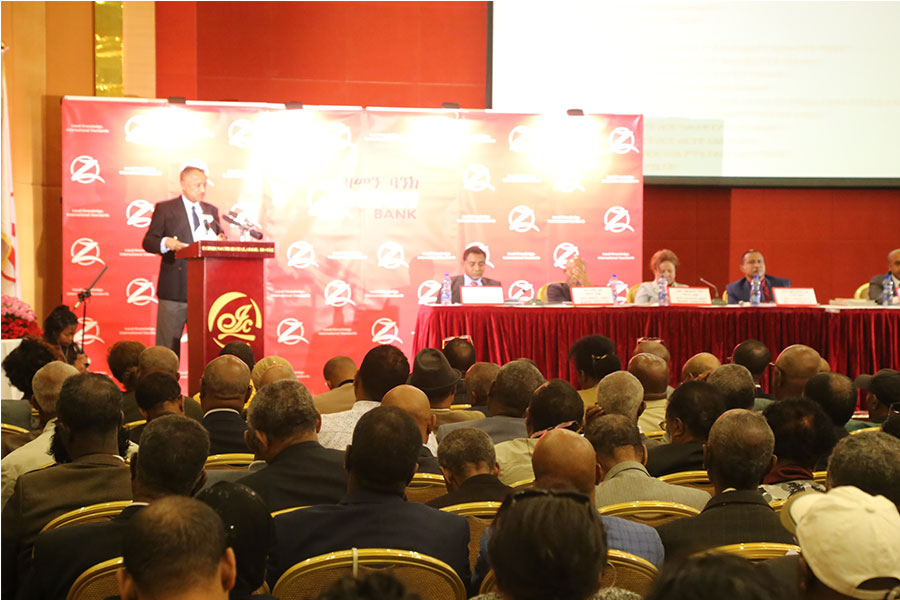
Fortune News | Jan 11,2020
Lion Insurance’s steady growth in net profit from last year’s operation, slightly exceeding half of the industry’s average of the 17 private insurance firms, comes amidst a continued decline in earnings per share.
The company`s senior executives characterised the drop in earnings per share as "not significant," and capital and profits are on growth trajectories.
While the modest increase in profit was driven by the reduction in claims and increased incomes from commission and investments, Lion’s Insurance earnings per share (EPS) has been declining in the past few years, down by 0.52 Br last year to 8.52 Br the previous year. This has been attributed to an injection of capital not matched by the profit after tax.
Lion Insurance’s net profit grew by 7.4pc to 61.3 million Br, representing over half the industry’s average of 105.8 million Br.
“This calls for the attention of the management,” said Abdulmenan Mohammed, a financial statement analyst based in London.
The firm reported this result after writing a gross premium of 436.4 million Br, an increase of 9.6pc, accounting for 74.2pc of the industry’s average. The insurance companies retained 61pc of the total non-life gross written premium. Lion's retention rate dropped by seven percentage points to 69pc, as Lion ceded 30.4pc to reinsurers. It is a trend the financial statement analyst cautions the firm’s executives that the decline undermines the gross written premium.
“The management should consider growing the retention rate,” he said.
Lion Insurance, incorporated in 2007 with 16 million Br paid-up capital, changed guards over a month ago, replacing the former CEO, Negasi Yoseph (PhD), with Aberham Mersha. The acting CEO, Kahsay Gebremicheal, has been running the company since Negasi left. Although the duration was not disclosed, the vacant position took a long time to fill with a thorough screening process, according to the Board Chairman, Abraham Gebreamlak.
Lion Insurance’s Board Chairman told Fortune the firm is optimising its retention capacity. He told shareholders met in October 2022 at the Elilly Hotel in the Casanchis neighbourhood that security concerns, the global pandemic, and the industry’s cut-throat competition were some of the year’s challenges. The insurance industry faces more profound challenges, such as low penetration, limited distribution channels, a weak regulatory framework, and constrained reinsurance capacity.
However, opportunities exist for the industry, with a largely untapped market of over 110 million people. The expanding middle class, rising disposable income, and increased awareness of insurance products provide opportunities for insurance companies to expand their customer base. The industry has experienced significant growth, with an aggregate premium reaching 10 billion Br in 2022. Motor insurance dominates the market, accounting for approximately 60pc of the total premium volume, while life insurance accounts for only five percent. Health insurance is gaining popularity, and property and casualty insurance is also growing, driven by increased demand from the construction and manufacturing industries.
A second-generation insurance firm, Lion saw a decline in net claims by 13.7pc in the reported year, showing that the company could control its claims well. The Board Chairman attributed the positive development to the firm’s adopting a strategy. The CEO credited "exhaustive and proper assessment of damage, a fair determination of claim costs and their timely settlement" as a prudent strategy his managment followed.
Lion’s revenue grew as it experienced expenses paid to employees’ benefits (99.1 million Br) and administrative costs (56.4 million Br), registering a 30.2pc and 20.3pc jump, respectively.
Abraham stated that inflation and salary adjustments were the factors behind the spike in total administrative costs. By investing in its employees, the company aims to improve overall performance and remain competitive in the market. Lion Insurance executives plan to implement strategic performance management tools, such as salary scale adjustments, in favour of employees.
Lion Insurance’s total assets increased by 35pc to 1.32 billion Br, mainly from the expansion of cash bank balances and reinsurance assets, representing a little over half of the industry average of 2.2 billion Br. The company’s capital and non-distributable reserves to total assets ratio fell by 3.1 percentage points to 19pc. However, the paid-up capital increased by 17pc to 194.9 million Br, still short of the 306 million Br threshold set by regulators at the National Bank of Ethiopia (NBE).
To meet the regulatory requirement, the company plans to propose raising capital at the next general assembly, the Board Chairman disclosed. The company’s subscribed capital, 300 million Br, would allow it to expand its operations further and improve its financial performance.
While Lion Insurance has seen some positive developments in its financial performance, there is still room for improvement. One of the 500 shareholders, who wish to remain anonymous, wants to see the company diversify its portfolio, particularly in life insurance, to become one of the "reliable and preferred insurance service providers in the market."
Abreham says that is what he will prioritise in his tenure as a CEO.
"Building a strong human capital, focusing on service excellence, enhancing operational efficiency, and making the company a composite insurer through life assurance business are major interventions I will work on to add value," he told Fortune.
PUBLISHED ON
Feb 25,2023 [ VOL
23 , NO
1191]

Fortune News | Jan 11,2020

Fortune News | Jun 18,2022

Commentaries | Feb 18,2023

Fortune News | Mar 21,2020

Delicate Number | Apr 26,2025

Fortune News | Jan 12,2019

Fortune News | Feb 10,2024

News Analysis | Apr 19,2025

Radar | Nov 28,2020

Sponsored Contents | Mar 03,2022

Dec 22 , 2024 . By TIZITA SHEWAFERAW
Charged with transforming colossal state-owned enterprises into modern and competitiv...

Aug 18 , 2024 . By AKSAH ITALO
Although predictable Yonas Zerihun's job in the ride-hailing service is not immune to...

Jul 28 , 2024 . By TIZITA SHEWAFERAW
Unhabitual, perhaps too many, Samuel Gebreyohannes, 38, used to occasionally enjoy a couple of beers at breakfast. However, he recently swit...

Jul 13 , 2024 . By AKSAH ITALO
Investors who rely on tractors, trucks, and field vehicles for commuting, transporting commodities, and f...

Oct 4 , 2025
Eyob Tekalegn (PhD) had been in the Governor's chair for only weeks when, on Septembe...

Sep 27 , 2025
Four years into an experiment with “shock therapy” in education, the national moo...

Sep 20 , 2025
Getachew Reda's return to the national stage was always going to stir attention. Once...

Sep 13 , 2025
At its launch in Nairobi two years ago, the Africa Climate Summit was billed as the f...